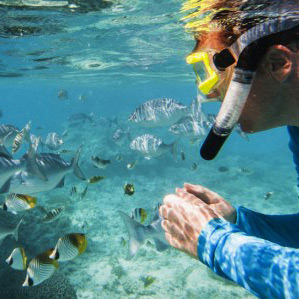Traveler’s diarrhea is a common problem when visiting developing countries. Here’s advice on avoiding it.
Whether you are traveling for business, sightseeing, visiting loved ones or adventure, the experience should be a stress-free endeavor. Traveler’s diarrhea is one of the most common occurrences in international travelers to developing counties. The risk of contracting it depends on your itinerary, the duration of the trip and eating behaviors. The good news? It’s easily avoided. Here is some general advice:
Water
- DO NOT drink tap water or use it to brush your teeth, even in fine hotels.
- Buy bottled (regular or carbonated) water that is sealed. Open the bottle yourself. Listen for the seal to break.
- In places where bottled water is not available, purify water yourself. Questionable drinking water may be treated by mixing it in a container with a chlorine or iodine preparation. Various purifying tablets are available in army surplus stores and drugstores. Follow the directions on the package.
- Camping/sporting goods stores sell water purification pumps, which are useful for people who are traveling to remote areas. Scientific studies have not proven these absolutely effective.
- Water from the hot tap, if it’s hot enough to feel uncomfortable on the hand is, for all practical purposes, pasteurized. After cooling, it is safe enough for oral hygiene, diluting drinks or washing eating utensils. Cold tap water, which some tourists unthinkingly use for tooth brushing or to dilute drinks, can be a source of infection.
Ice
- Freezing tap water does not kill the germs living in the water.
- When ordering a drink, ask for it without ice.
Soft drinks
- Most carbonated beverages are OK (without ice). Open the bottle or can, yourself. Listen for the seal to break.
- In countries with poor sanitary standards, it’s wiser to avoid beverages of unknown brand.
Coffee/tea
- If served steaming hot, coffee and tea should be fine to drink.
Juice
- No fresh-squeezed juice. Drink canned or bottled juice only. Open the bottle or can yourself. Listen for the seal to break.
Salads and raw vegetables
- DO NOT eat raw vegetables.
- It’s OK to eat well-cooked vegetables.
Fresh fruit
- Take only fruit with skin intact, so that you can peel and core it yourself.
- Choose thick-skinned fruits only, such as bananas, oranges and papayas.
- Do not rinse fruit in tap water. Instead, rinse it in bottled water or wipe with antiseptic towelettes.
Milk/dairy products
- Milk and daily products are OK if pasteurized, but developing countries typically DO NOT pasteurize their dairy products.
- Read the labels on milk cartons to see if they are pasteurized.
- Canned milk and powdered milk are OK, provided they are diluted with bottled or purified water.
- Avoid products like butter, cheese, yogurt and ice cream. You may eat dairy products if they are part of a well-cooked dish.
Meats and fish
- Insist on well-done meat, even if you usually prefer it rare or medium rare.
- The same applies to fish and other seafood. Fish and other seafood should be avoided altogether if they are available only raw or undercooked.
Sauces
- It’s best to avoid sauces, especially if made with dairy products.
General tips
- Wash your hands before eating.
- Eat food that has been freshly cooked and is still hot when served.
- Avoid food from street vendors.
- Hot (meaning spicy) cuisine is NOT necessarily safe.
If you do contract traveler’s diarrhea, treatment is based upon your symptoms. The most important treatment is to replace the fluids that you are losing. Drink safe, clean fluids.
This post was written by Paula Monte, PA-C, a physician assistant with the Vanderbilt Travel Clinic.

The Vanderbilt Travel Clinic is dedicated to protecting international travelers from disease. For information on health-related services to prepare for a safe and healthy trip, call 615-936-1174.

